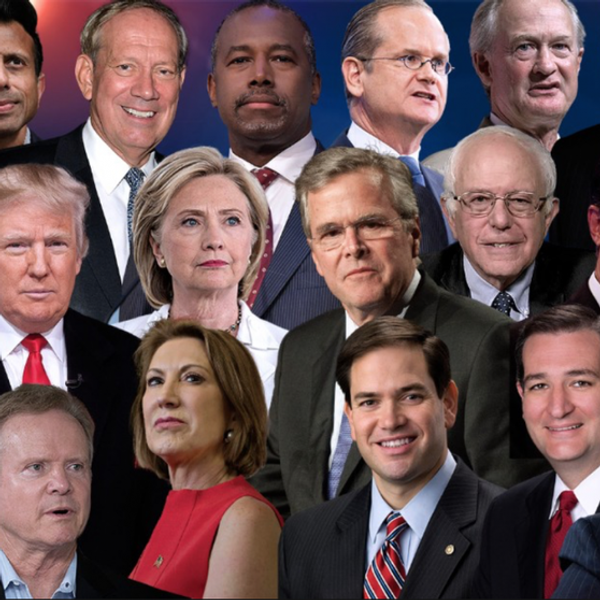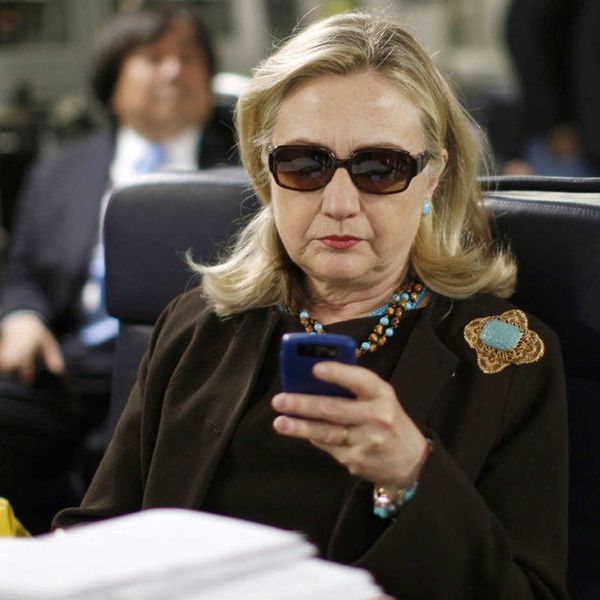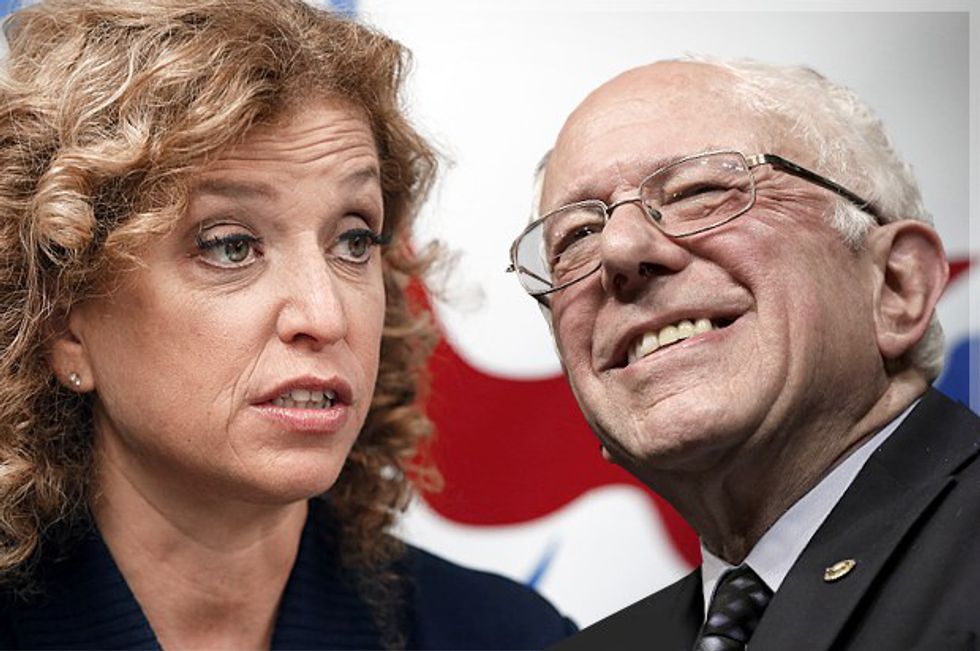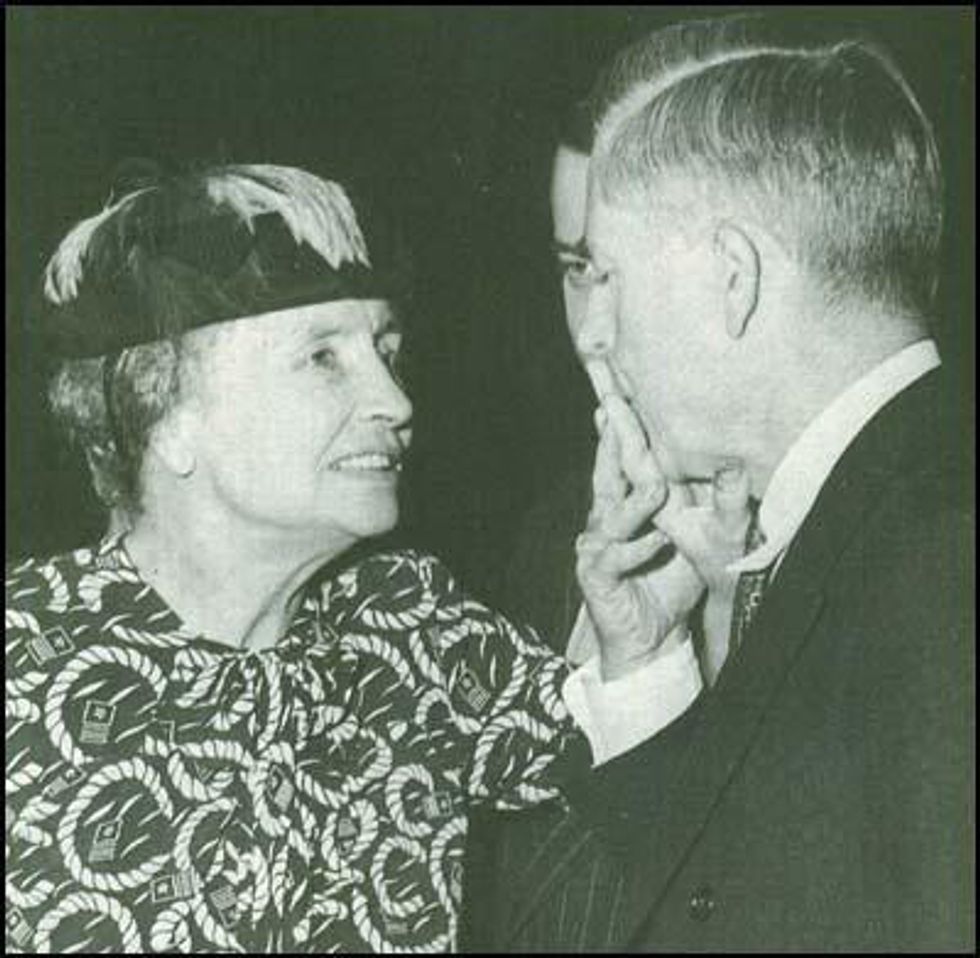Democratic presidential candidate Sen. Bernie Sanders, I-Vt. has been on fire lately, taking seven straight primary states in a row since his defeat by former Secretary of State Hillary Clinton in Arizona on March 22. With the nomination at stake and the New York Primary coming up, I keep thinking to myself how a man who calls himself a “democratic socialist” in America is giving out a message that is resonating with people all across this country. It is a message that has been lost to history but comes in the form of an unlikely character you probably have never heard of — Henry A. Wallace.
In 1940, Roosevelt is running for his third term, the first president in U.S. history to ever do so. His Vice President at the time, John Nance Garner, is a very conservative southern elitist Democrat who did not like the way FDR was implementing his New Deal policies along with helping make compromises with labor unions. But what put him over the edge was The Judicial Procedures Reform Bill of 1937. This Bill was proposed by FDR who was frustrated with the conservative majority Supreme Court that kept striking down his New Deal proposals as unconstitutional.
In the bill, History.com explains, stated that anyone on the court that was over 70 could retire with full pay and if that justice refused to retire the president would appoint an “assistant” justice, this would give the President a liberal majority no matter what. It was never enacted because before the bill even came to a vote in congress, two of the conservative justices that were over 70 switched their ruling on some New Deal policies. This political action is called “court packing” and it is still a controversial historical event to this day. So John Nance Garner decided to run against FDR in 1940 for the Democratic nomination, and FDR had to choose a new Vice President. He picked Henry Wallace who was Secretary Agriculture at the time. Roosevelt picked Wallace because he was very pleased with his work on saving the farming industry and supporiting Roosevelts New Deal policies. According to Molly Jahn’s article “The Legacy of Henry A. Wallace” in "Grow: Wisconsin’s Magazine for the life sciences," Wallace is known by historians as the greatest Secretary of Agriculture ever for helping farmers get out of the Dust Bowl by enacting programs that sustained farming income, maintained food production and helped apply new scientific farming techniques that led the U.S. into the Green Revolution. Wallace learned so much of his farming technics from famous American George Washington Carver. Roosevelt and Wallace would end up winning both the nomination along with the general election against Republican businessman Wendell Willkie in 1940.
So why does Bernie Sanders remind me of Henry Wallace? In this 2016 election cycle, the Democratic establishment really does not like Sanders, due to the fact he has run as an Independent candidate his entire life in the house and senate. A lot of Democrats do not like Sanders, also, because of the fact that he is too liberal for the party and doesn’t take corporate money in elections. Henry Wallace had to deal with this his entire political career. When Roosevelt announced to the DNC that Wallace was going to be his running mate, Democratic delegates booed him; they hated how liberal Wallace was (he was more liberal than FDR on most issues, a man way ahead of his time). The only reason the DNC voted Wallace as VP is because FDR threatened to decline the Presidential nomination if they didn’t. Bernie Sanders is fighting against the same Democratic establishment as Wallace did in the 1940’s!
When we talk about the policy positions of these two men, it is amazing how much they are alike. During World War II, Wallace fought with conservative Democrats in FDR’s cabinet on how to handle supplies during the war, which infuriated the party even more. Wallace also famously clashed with a conservative journalist named Henry Luce, who wrote an article calling the United States to create a new “American Century” in 1941. It talked about how the U.S. after World War II should fulfill the role of a missionary and act as the good Samaritan by spreading democracy around the world. Wallace, in response, created a speech called “The Century of the Common Man.” He talked about how the world must rid itself of corporatism and colonialism, and instead spread the idea of New Deal liberalism around the world through peace and labor. Wallace hated imperialism, especially the British and French empires.
According to CommonDreams.org in the 2016 Democratic PBS debate, Bernie Sanders talked about how U.S imperialism is hurting the world; “I think the United States should be working with governments around the world, not get involved in regime change”. During the debate, Sanders criticized Hillary Clinton for taking advice from former Nixon Secretary of State Henry Kissinger, who hated Communists so much that he supported right-wing dictatorships to stop them. One of the worst things Kissinger did was bombing Cambodia in the late 70’s, which created a famine and led to the rise of mass murderer Pol Pot. Sanders also protested against the Vietnam War as a college student, and in the House of Representatives, he voted against the Persian Gulf War and Iraq Invasion. After America went into the Persian Gulf War, he gave this speech about how American intervention would create instability in the Middle East.
The message of bringing all Americans together to rally around a cause comes from both of these men, too. During the Detroit Race Riots of 1943, Wallace said “we cannot fight to crush Nazi brutality abroad and condone race riots at home. Those who fan the fires of racial clashes for the purpose of making political capital here at home are taking the first step toward Nazism; We cannot plead for equality of opportunity for peoples everywhere and overlook the denial of the right to vote for millions of our own people. Every citizen of the United States without regard to color or creed, whether he resides where he was born or whether he has moved to a great defense center or to a fighting front, is entitled to cast his vote.” (New Deal Network), Wallace was saying this in 1943, 22 years before the voting rights act of 1965 was signed. This speech reminded me of this idea of unity that is centered in the Sanders campaign ad, titled “Together”.
According to u-s-history.com in 1943, Wallace made a trip to Latin America to gain more support for the allies in the war. In doing so, he persuaded 12 countries to declare war on Nazi Germany. Concerned about the state of Latin American workers, he made it so that the Board of Economic Warfare had to supply contracts made with Latin American countries that included a “labor clause." They stated that producers had to pay their workers fair wages, and provide them with a safe work environment. But the United States had to help pay for these improvements, which the U.S Department of Commerce didn’t like. Wallace believed that everyone should be a part of a union, as to not be subjugated to corporate greed. Again, Sanders, throughout his career, has been dedicated to working people in the United States. From standing at the picket lines with workers, to opposing trade deals that outsource jobs to other countries. Recently on the campaign, he gave a speech to a group of Verizon workers who are on strike because they have not been given the healthcare benefits they deserve.
In 1944, with the war turning in the favor of the allies and the American unemloyment rate the lowest ever in American History, people were very happy with the administration. With the 1944 election coming up, FDR intended to run for his fourth term. Polls were showing that 65% of Americans wanted Wallace to be FDR’s VP again. But the Democratic establishment and the Department of Commerce were sick of Wallace’s union favoring, anti-imperialist, civil rights motives in government. In Oliver Stones, “Untold History of the United States,” he goes into detail about how the 1944 Democratic Convention unfolded. What happened was the Democratic establishment, led by big party bosses, wanted to put in a VP candidate with few enemies (unlike Wallace who had many). So, they proped up a lesser known Senator from Missouri. Wallace, knowing that the party bosses were trying to take him down, made a speech at the convention that most historians today would call “political suicide.” He said, "the future belongs to those who go down the line unswervingly for the liberal principles of both political and economic democracy regardless of race, color, or religion. In a political, educational, and economic sense there must be no inferior races .... The future must bring equal wages for equal work regardless of sex or race." Labor leaders, and thousands of Wallace supports, roared with applause. People chanting “we want Wallace!” On the first ballot, the Democratic delegates had Wallace up 429.5 to Truman with 319.5, but Wallace needed 159.5 votes to secure the majority. The party leaders then started to cut deals with the delegates, promising them cabinet positions and cash payouts to vote for Truman. With the second ballot vote, Truman killed Wallace (1031 to 105). Robert E. Hannegan, head of the Democratic National Convention, even said said that he wanted his tombstone to read, “here lies the man who stopped Henry Wallace from becoming president of the Unites States.” And as we know from history, on April 12, 1945, FDR died, and Truman became president.
The way the DNC treated Wallace for being an outsider in the establishment in 1944 is the same treatment Sanders is getting today. Think about it; Debbie Wasserman Schultz, current head of the DNC, has been making it very hard for Sanders to do well in the primary. Whether it be not scheduling enough debates, or working for Hillary Clinton’s Presidential campaign in 2008 (which is a major red flag). Even a couple of months ago, a Sanders staffer improperly accessed Clinton’s voter data, and the DNC cut the Sanders campaign off from their own voter data. The Sanders campaign had to sue the DNC to restore access to its data. Sanders also has to win over the votes of super delegates who are current governors, senators, house members and party members that make up around 10 percent of the vote of the Democratic primary. Right now, these delegates are mostly siding with Clinton, but Sanders can still win them over, which is what happened in 2008 when President Obama was running against Clinton. These super delegates were created by the Democratic Party in the 80’s, to make it so that grassroots politician’s like Henry Wallace and Bernie Sanders could never win the nomination against party leaders.
Before FDR died. Wallace was appointed as Secretary of Commerce. When Truman took over as president, Wallace opposed a military stance against the Soviets in the Cold War, and distanced himself from a lot of people who he worked with as vice president. Truman fired Wallace in 1946, the last person who was in FDR’s original cabinet. He would then become the head editor for the liberal magazine The New Republic (which still exists), and criticized the Truman Doctrine’s proxy wars against communism that were happening all over the world. Wallace would then run for president in 1948 for the Progressive Party with a platform that included universal healthcare, ending the Cold War, full voting rights for African Americans and ending Jim Crow. He had African Americans staffers working with whites, running his campaign and refused to speak in front of segregated areas. The south was brutal to him, throwing food at him when he was giving speeches and when they were leaving the area. Time Magazine viciously attacked him for working with African Americans, not denouncing the Communist Party USA’s endorsement and his engagement with Russian peace activist Nicholas Roerich during the time of his vice presidency, whom people thought was a communist but wasn’t (these were known as the "Guru Letters") (Senate.Gov). Since the population thought he was a communist, he got crushed in the general election. Just like today, the “liberal media” has viciously attacked Sanders on everything he has said. From the Washington Post putting out 16 anti-Sanders Articles in 16 hours, to the recent New York Daily News interview where they have accused him of blaming Sandy Hook victims for suing the gun manufactures, to them even having the gall to call Sanders anti-Israel because he wants peace in the Gaza Strip. The National Review even called Sanders a National-Socialist, you know what National-Socialists are? They are Nazis.
Now, was our former United States Vice President, Henry Wallace a communist? No. In 1933, FDR recognized the Soviet government 16 years after the “October Revolution” communist takeover of Russia, which had caused the U.S cut its ties to. FDR mainly did this to send a message to Japan to stop their expansion in Asia. Wallace was against this, he didn’t want the Soviet Union to be recognized because there was no freedom of religion. Later on as VP Wallace went to the Soviet Union in 1944, Wallace visited what they called a “Potemkin Village” which is a place sanitized of slave labor. He was impressed on how hard people were working and how they were proud to work for their country and not corporations. Wallace thought the way of beating the Soviets was through peace and better productivity, not through war. But in 1952 he published "Where I Was Wrong" in The Week Magazine, talking about regret of trusting the Soviets, learning about the work in the gulags in Russia and said, “One thing of which I am very proud is that I risked my public career for the sake of promoting peace at a time when it was very unpopular to talk about such things. No figure of high public position in the US tried harder than I to bring about understanding between Russia and the Western World before it was too late. Many people believe Roosevelt and I tried to appease Russia. It is true that both of us saw the possibility of future conflict and wanted to prevent it. But I am one of those who believe that if Roosevelt had remained alive and in good health the whole course of history would have been changed and we would not today be spending $60 billion a year on arms. What I wanted was peace, but not peace at the price of Communist domination. I thought the Soviets had more sense than to do what they have been doing during the past few years. There I was proved wrong by subsequent events. Yet I know I am not wrong in predicting that if the Soviets continue along present lines they may possibly cause disaster to the whole Western World--but in the process they will certainly destroy the Politburo, the Communist Party in Russia, and bring misery to the people of Russia and her satellites.” ( Wallace was fooled by the Soviets but so were a lot of people during war. They didn’t understand how evil Stalin was until the war was over because they wanted to stay as allies to defeat the Nazism. Harry Truman’s entire presidential cabinet was made up of capitalist tycoons on Wall Street and big businessmen. With the Republicans attacking the Democrats for being too soft of Communism in the 1948 election in return the Democrats used Wallace’s Progressive Party campaign as a scapegoat and painted Wallace as this communist, just because he wanted peace with the Soviets. The entire political establishment hated that he stood with peace with the Soviets and his idea of making New Deal economics as a global push made him look in the public eye as a communist. This is the reason we don’t learn about Henry Wallace in the history books because of a false picture painted by the establishment’s political atmosphere.
People today are comparing Bernie Sanders to FDR which in I think is a fair point when we talk about economics. The only difference between the two is Sanders has always been an independent his whole life and is now running as a Democrat. I think this is a smart move because Wallace did the exact opposite he was a Democrat most of his life but ran third party and if you know your history third party never gets the kind of money that the two major parties do. But I think when we look at the entire scope of policy positions, I think that Wallace and Sanders are exactly alike. Especially when it comes to civil rights, FDR, even though he helped improve the lives of African Americans and Native Americans during the depression, he put Japanese Americans in interment camps during World War Two. Wallace called for reparations for the Japanese Americans in his life which didn’t happen until Ronald Reagan was president in 1980. I believe that Wallace would have also accepted Jewish refugees fleeing Nazi Germany which Roosevelt didn’t do; Sanders wants to accept Syrians refugees. Roosevelt did this because he was scared that people like Charles Lindbergh and Henry Ford who were anti-Semites would get public to go against FDR on why he would be taking in refugees. There is an alternate history book called The Plot Against America by Phillip Roth that talks about Limburgh becoming president which I highly recommend and reminds me a lot of the rise of Trump. According to Peter Dreier of the Huffington Post, Wallace wanted to put women into what he called “first class citizenship” giving them equal pay just like what Sanders wants. Wallace wanted a national healthcare system which according to Physician's for a National Health Program said FDR pushed for but never fully supported. Roosevelt was mainly focused on creating government job programs which conservatives still didn’t want and were certainly were never going to put through universal healthcare. People forget that Roosevelt used 3,522 executive orders to push through most of his agenda (the most a president has even done). According to TruthOut, American economist John Kenneth Galbraith even called Wallace "second only to Roosevelt as the most important figure of the New Deal." I believe that if Henry Wallace was president, most of the Jim Crow laws would have been almost been eliminated and we would have been so far ahead of every country when it comes to human rights. Most historians question whether or not Wallace would have dropped the atomic bomb on Japan. In my opinion he wouldn’t have and Japan would have surrendered anyway without them with the Soviets invading from the north. It has been proven in later research that the dropping of the bomb was more of Truman’s way of showing American strength against the Soviets, not strategy in defeating the Japanese. I think that under a Wallace administration the idea of peace in the Cold War Era would have created less authoritarian regimes than the United States sided with in the name of fighting communism in places like Iran, Cuba, Vietnam, Korea, and South America. With less military spending also we would have one of the most highly educated and hardest working populations in the world. I do not believe that Ronald Reagan defeated the Soviets by outspending them. I agree with this group called the essentialists like Richard Pipes, Ernst Mandel and Martin Malia that believed the Soviet Union was destined to fail because it was just so corrupt and they wouldn’t be able to modernize with the invention of the internet. They won’t be able compete with the new global economy of the 21st century.
In the end, I have a question for the citizens of America; do we really want to keep playing political games where only the party matters more then issues that effect the people? Or are we going finally going to hold our politician’s accountable for once and elect someone that is trying to fulfill a true American dream that was crushed 70 years ago? I don’t know about you but I’m done with the waiting. The Democratic Party needs to become the party of the people again, and stop trying to fit in this post 'Citizens’ United' America. Let’s end the corruption, create a better world for our children and demand that government hears our voices instead of the elite ruling class in America.
I’m going to end with a quote from Henry Wallace’s “The Danger of American Fascism” he wrote for the New York Times in 1944, "Fascism is a worldwide disease. Its greatest threat to the United States will come after the war, either via Latin America or within the United States itself; Democracy to crush fascism internally must demonstrate its capacity to "make the trains run on time." It must develop the ability to keep people fully employed and at the same time balance the budget. It must put human beings first and dollars second. It must appeal to reason and decency and not to violence and deceit. We must not tolerate oppressive government or industrial oligarchy in the form of monopolies and cartels. As long as scientific research and inventive ingenuity outran our ability to devise social mechanisms to raise the living standards of the people, we may expect the liberal potential of the United States to increase. If this liberal potential is properly channeled, we may expect the area of freedom of the United States to increase. The problem is to spend up our rate of social invention in the service of the welfare of all the people.” (New Deal Network)
Sources:
United States History: Henry A. Wallace
Grow: Wisconsin's Magazine for the Life Sciences
Truth Out: Henry Wallace, America's Forgotten Visionary Politician
Huffington Post: Henry Wallace: America's Forgotten Visionary Politician
Physicians for a National Health Program
United States Senate: Henry Agard Wallace, 33rd Vice President
























